Clinicians emphasize: Monoclonal treatments are not a substitute for vaccines
By JULIE MINDA
For about a year, drugmakers have been rolling out a series of treatments that are helping reduce hospitalization and death in people infected with COVID-19. In recent months, health care facilities across the U.S. have been increasing their use of one such family of drugs, monoclonal antibodies, to improve patient outcomes.
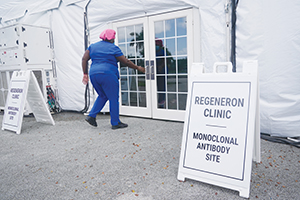
A sampling of Catholic health ministry providers says they have been exploring how best to increase patient access to monoclonal antibody treatments. The drugs are not a fail-safe and providers warn there is a dangerous misperception among some unvaccinated people that monoclonal antibodies make vaccination unnecessary.
Dr. Syed Raza calls that view "wacky, and a fundamental misunderstanding of public health." Raza is vice president of medical operations for St. Luke's Health-The Woodlands Hospital, a CommonSpirit Health hospital near Houston.
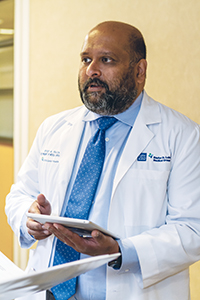
"The vaccines are being used as a preventive tool on a wide scale to change and improve public health and decrease the incidence of large-scale illness," whereas the monoclonal treatments are an imperfect, reactive measure that must be administered within a tight time window and so carry a much higher risk of poor outcomes for patients than do the vaccines, he says.
He adds, "waiting to get COVID and expecting to rely on monoclonal antibody treatments to get better is like playing Russian roulette."
All the ministry providers who spoke with Catholic Health World emphasize that vaccines remain the first line defense for COVID, and, while monoclonals have proven effective in reducing the severity of COVID infection, their limitations make them a far inferior protection from COVID than vaccines.
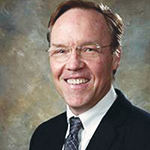
Dr. Steven Standaert, medical director for antimicrobial stewardship for Providence St. Joseph Health's southwest region, says, "Given the complexity and risk associated with using monoclonals, there is a great misunderstanding among the general public about how they should be used. This is not equivalent to the vaccine. This is not the miracle cure."
Emergency use
According to the Food and Drug Administration, monoclonal antibodies "are laboratory-made proteins that mimic the immune system's ability to fight off harmful pathogens such as viruses." Over the past year, the FDA has granted emergency use authorizations for five different monoclonal antibody drugs, used either individually or in combination.
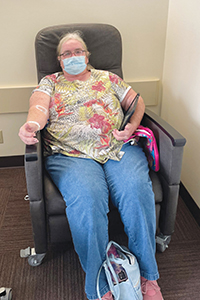
Providers have been switching among the different monoclonals, based on their availability and efficacy against a particular variant of the virus.
The monoclonals most in use currently, according to those who spoke to Catholic Health World, are REGEN-COV, which is a combination of the drugs casirivimab and imdevimab and can be delivered by subcutaneous injection or intravenously; and a cocktail made up of the drugs bamlanivimab and etesevimab, which only can be given intravenously. The REGEN-COV doses are given in four injections, three minutes apart; and the monoclonals given intravenously take an hour to infuse. An hour of observation is needed after any of these treatments.
Hospitalization reduction
The drugs are optimally used within 10 days of COVID symptom onset for people at high risk of having serious complications from the virus and/or requiring hospitalization. The drugs also can be used prophylactically for people in high-risk categories who have been exposed to COVID but who have not tested positive. The drugs are approved on an emergency use basis for patients ages 12 and up.

Dr. Douglas Waite, Covenant Health senior vice president and chief medical officer, says research shows that when given early enough in the COVID disease progression, monoclonals can reduce the risk of hospitalization and death by nearly 80% for those at higher risk of severe disease. He said most of Covenant's patients who have taken monoclonals have seen their symptoms reduced and have avoided hospitalization.
While both vaccinated and unvaccinated people can take the monoclonals, the vast majority of people needing the drugs are those who cannot or will not be vaccinated, according to the clinicians who spoke to Catholic Health World. The federal government purchased monoclonal antibodies and so the drugs are available at no cost to patients. While Medicare and Medicaid pay for administration of the drugs, coverage under private insurance varies, according to the Department of Health and Human Services.
Patients need a prescription or an order from a medical provider to receive monoclonal treatment.
Seeking efficiencies
Providence St. Joseph Health hospitals throughout the system's five-state service area have been administering monoclonals, and some have set up clinics for this purpose.
Standaert says despite monoclonals' effectiveness, the therapy can present challenges for providers. For instance, the administration process is staff-intensive, and there is a workforce shortage. Monoclonals at times have been in short supply.
Standaert says to gain efficiency and take the load off of swamped emergency departments, two Washington state hospitals teamed up to open an outpatient clinic to administer monoclonal antibody treatments that had been given in their ERs.
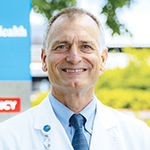
PeaceHealth Chief Physician Officer Dr. Doug Koekkoek says that the northwestern U.S. health care system has been administering monoclonal therapy in the three states where it operates, with its largest hospitals setting up infusion centers and its rural critical access hospitals injecting or infusing the drugs in their emergency departments. He says while COVID surges have driven demand, the spikes have been manageable in most of the communities PeaceHealth serves.
With relatively high vaccination rates in many of those communities, the need for monoclonals has rarely outstripped PeaceHealth's supply. In late summer, seven states with relatively low vaccination rates had dominated when it came to monoclonal orders, prompting the federal government to intervene by buying up monoclonal supplies and taking over distribution of those drugs. Most state health departments also play a role in distribution of monoclonal antibodies.
The Woodlands is among the CommonSpirit hospitals that opened infusion clinics when influxes of patients seeking monoclonals stressed already busy emergency departments during surges. The Woodlands partnered with the Texas and Montgomery County health departments and HCA HoustonHealthcare Conroe to convert a section of a shuttered hospital into an infusion center. The state and county and the two hospitals are providing staffing for the center.
Raza says that site can infuse about 150 patients per day, compared to a half dozen in the hospital's emergency department. The Woodlands deployed infusion teams on a mobile unit during the worst of the surges, to treat patients in their homes when they could not travel to the clinic.
Mercy Hospital Oklahoma City, part of the Chesterfield, Missouri-based Mercy system, set up a monoclonal infusion clinic amid high patient demand. As of mid-October, its clinic was still treating patients six days a week.
Eric Flaming, the hospital's antimicrobial stewardship pharmacist, says COVID-positive patients are not infused in the same physical space as COVID-negative patients or cancer patients receiving immunotherapy drugs.
The hospital recommisioned an unused infusion room in its main building as its monoclonal clinic for COVID patients.
Amanda Kraus, the clinic's director of operations, says the facility premixes the monoclonal cocktail to cut patients' throughput time. And it has paired family members seeking treatment into one infusion bay to free up other bays for additional patients.
Waite says Covenant, which operates in six northeastern U.S. states, administers monoclonal drugs to outpatients in all its hospitals. In mid-October, Covenant's Bangor, Maine, hospital, St. Joseph Healthcare, set up a dedicated monoclonal infusion clinic on its campus for outpatients. In its skilled nursing facilities, including on short-term rehab units, the monoclonals have been used in the care of individual residents who qualify for the experimental treatment, or when several staff or residents test positive for COVID, to reduce the risk of infection spread to patients.
Ascension Sacred Heart in Pensacola, Florida, is among the Ascension hospitals with dedicated monoclonal antibody treatment clinics for COVID patients. Currently, Sacred Heart operates an antibody clinic for pregnant women — it is located in the hospital's obstetric emergency department.
